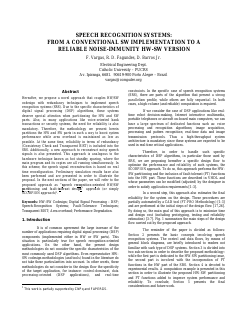
Speech Recognition Systems: From a Conventional SW Implementation to a Reliable Noise-Immunity HW-SW Version
Fabian Vargas, Rubem Dutra Fagundes, Daniel Barros Junior
DOI: 10.14209/sbrt.2001.25100304
Evento: XIX Simpósio Brasileiro de Telecomunicações (SBrT2001)
Keywords: HW-SW Codesign; Digital Signal Processing – DSP; Speech-Recognition Systems; Fault-Tolerance Techniques; Transparent BIST; Area overhead; Performance Degradation
Abstract
"Hereafter, we propose a novel approach that couples HW/SW codesign with redundancy techniques to implement speech recognition systems (SRS). Due to the specific characteristics of digital signal processing (DSP) algorithms, these systems deserve special attention when partitioning the HW and SW parts. Also, in many applications like voice-oriented bank transactions or security systems, the need for reliability is also mandatory. Therefore, the methodology we present herein partitions the HW and SW parts in such a way to boost system performance while area overhead is maintained as low as possible. At the same time, reliability in terms of redundancy (Consistency Check and Transparent BIST) is included into the SRS. Additionally, a new approach to reconstruct noisy speech signals is also presented. This approach is analogous to the hardware technique known as hot standby sparing, where the main program and its copies are all running simultaneously. In this scheme, the speech signal reconstruction is based on real time reconfiguration. Preliminary simulation results have also been performed and are presented in order to illustrate the proposal. In the next sections of the paper, we will refer to the proposed approach as “speech recognition-oriented HW/SW partitioning and fault-tolerant design” approach (or simply SCORPION approach)."Download